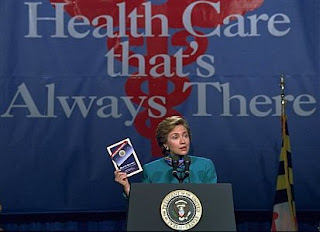 Been getting lots of flak on a recent post about health care costs, and you know how much I love that. But one thing that comes up time and again, because people just can’t seem to see past the political brainwashing, is that my message is NOT about whether people should have, get, or pay (or not pay) for health insurance. No, that’s what the politicians talk about…that’s not my message.
Been getting lots of flak on a recent post about health care costs, and you know how much I love that. But one thing that comes up time and again, because people just can’t seem to see past the political brainwashing, is that my message is NOT about whether people should have, get, or pay (or not pay) for health insurance. No, that’s what the politicians talk about…that’s not my message.
My message is this: Health comes from within. It’s what you do for your body, regularly, that determines whether you will experience wellness or not. Absolutely no medicine will give you health. No organ removal will give you health. Either one may help you get over a hump, but none will provide you with health–only YOU can do that.
The western medical system is necessary for, and outstanding at, saving lives–it’s crisis care, or more aptly, sick care. As far as saving lives goes, nothing is better then western medicine. But let’s not mistake that for health. The reality is that the medical system has been the dominant system for over a century; and in its desire to protect the public (and retain full and absolute power economically, politically and as the cultural authority), it has infused its sick-care paradigm into every facet of the cultural psyche. The predominant view of “health care” is of going to the doctor for a check-up and then getting medication.
Except for one little problem: What medical doctors provide for the public has nothing to do with good health. Now let me explain, because certainly, saving lives preserves health in the most fundamental sense. Yes, I will give you that. But is health merely the absence of illness or disease? No! No logical person believes that today. In fact the World Health Organization’s (WHO) definition is just that:
Health is a state of complete physical, mental, and social well-being and not merely the absence of disease or infirmity.
Duh.
 Worse yet, we see now how irresponsible use and/or overuse of the medical system actually makes people sicker. Why the hell are people fighting for more of that? Everybody in the U.S. has access to emergency care, so nobody is ever left out in the street to die because they have no medical insurance–nobody.
Worse yet, we see now how irresponsible use and/or overuse of the medical system actually makes people sicker. Why the hell are people fighting for more of that? Everybody in the U.S. has access to emergency care, so nobody is ever left out in the street to die because they have no medical insurance–nobody.
Do not fool yourself into thinking that the current health care debates are about that. Nobody gets turned away from crisis care. No, what some people and politicians are so desperately fighting for is for medical care to continue as the predominant form of “health care”, beyond crisis care, in illness or in health.
And the medical industry sits well in the paradigm it has created, with many people never really thinking about their health until it goes awry.
It’s the I-can-neglect-my-health-and-then-be-saved-by-medical-care syndrome; the “just give me the statins, it’s too hard to change my lifestyle” mentality; the “I just can’t get myself to exercise and change my diet, so I think I’ll get a stomach staple” way of thinking, just perfect for the elective-c-section,-run-to the-doctor-for-every-sniffle,-and-undergo-multiple-cosmetic-enhancements crowd.
Yes, today’s medical care has very little to do with health–it’s the sickness paradigm imposed onto the public perceptions of health. And you wonder why the U.S. ranks so poorly in health status for a developed nation that spends a large portion of its economy of medical care? Duh.
No, medical care ain’t health care–it’s sick care. And it’s foolish to so adamantly demand it as an inalienable right. You want the drug addiction and the poor health that comes along with the reliance on modern medicine and it’s prehistoric “health” paradigm? Then be my guest. But not me…I’ll take my chances taking care of my health. And if I have a crisis, well I know the best place to go, insurance or not.























